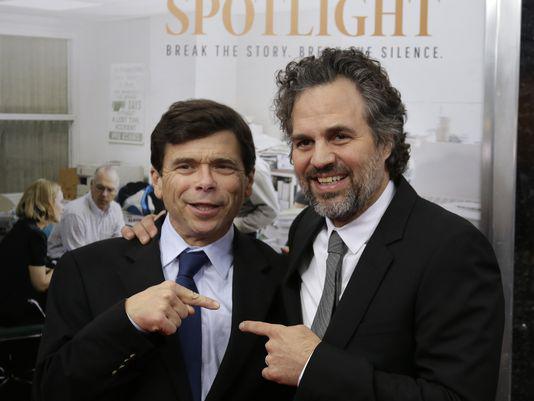|
Graves: 'Spotlight' shines, reminds of abuse victims
By Chris Graves
I sat in the darkened theater as the credits rolled for Spotlight, tears streaming down my face. Frankly, I was surprised by my reaction. I did not anticipate being emotional. The much-acclaimed movie, which unwinds the story of how a team of Boston Globe reporters uncovered and exposed the coverup of widespread pedophilia in that city’s Catholic Church, is indeed riveting. It is also painfully accurate in the often mundaneness and tedium of reporting, in how hard the truth is not only to find but to verify and in the small victories that when knitted together can sometimes take down powerful and revered institutions. Many have said the film is a love story to journalism and a call for American news outlets to recommit to the mission of tough-as-nails, feet-on-the-ground investigative local reporting. Agreed. No argument here. But that is not why I cried. I wept for the countless victims of the abuse. I cried not out of sadness, but rather I was moved by their bravery to come forward and recount how the men in whom they had put their faith, stole that and their childhood and their innocence. I was moved by the power of the truth. There’s a scene in the movie where reporter Michael Rezendes, played by Mark Ruffalo, interviews an abuse survivor. At first, the man does not want his name used and then outlines the abuse. At the end of the interview, on his way out, he tells the reporter to use his name, to hold the church accountable. It was in that moment, I thought of Mark London. I was a reporter at the Star Tribune in Minneapolis 13 years ago when London, then 40, called out-of-the-blue with one request: Don’t stop digging on a story we had been working on that eerily mirrored the Globe’s recounting of priest sex abuse. London said had been both sexually and physically abused for years while a student at a residential prep school run by the U.S. Crosiers, a Roman Catholic order of priests and brothers, in a small Minnesota town in the 1970s and 1980s. London had read our stories, which came after the Globe’s investigation, and he said we needed to know the abuse in Onamia, Minnesota was more widespread and insidious then we had reported. The details he shared were almost unbelievable. Then he dropped a bombshell, the Crosiers had paid him $150,000 in a confidential settlement in 1989 to keep him from filing a lawsuit against the order. London accused four priests of sexual abuse over years and called the settlement “hush money,’’ because it restricted him from disclosing the truth. The order never admitted wrongdoing in the case. London still had a copy of the settlement and he shared it with us, in clear violation of the agreement. He told us to use his name. He gave us other names of boys with whom he went to school. We spent months tracking them down. Some said they, too, were abused; others closed the door on us. Others we could not find. But it’s not the details of the abuse I remembered in the theater last week, but London’s words: "If you can't turn to your pastor, whether you're Catholic or Protestant or whatever, who do you turn to in your greatest joy and deepest pain?” He said it better than I ever could. The stories of abuse in Onamia and Boston may never have been told without the courage of victims coming forward and telling their truth. At the end of the movie, just before the credits, the names of more than 100 American towns and in another 100 places worldwide scroll past. Each is where a major abuse scandal has been discovered, according to the filmmakers. There were too many to read, but Onamia nearly jumped off the screen. It was then I started to cry. I know I thanked London for recounting his past with me when we met months later during his layover in Minneapolis. We shared dinner, drinks and hug or two. But I’m not sure I ever thanked him for his courage. So, wherever you are Mr. London: Thank you. Thanks, too, to the scores of survivors who talk to reporters. Without you, the stories, I fear, would never get told. Contact: cgraves@enquirer.com
|
.
Any original material on these pages is copyright © BishopAccountability.org 2004. Reproduce freely with attribution.
